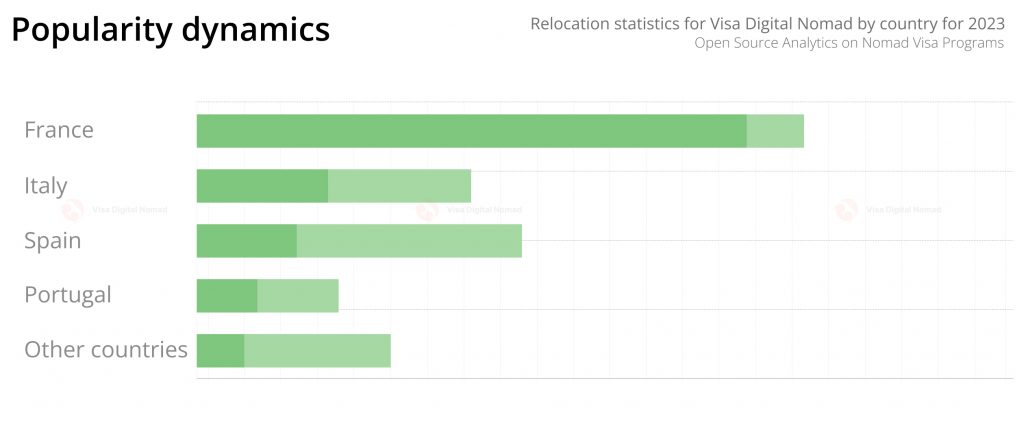IT and digital technology sector employees are leaving Russia en masse. This decision is made by people who think in terms of opportunities, seek freedom and professional development, and love to travel. Many chose a country for relocation two years ago but were looking for opportunities to immigrate.
The global demand for qualified workers exceeds supply. IT specialists in Europe and Asia find jobs in local and foreign companies and participate in hackathons and meetups for networking. Over 40 countries issue professional residence permits and digital nomad visas with the prospect of obtaining permanent residency.
Facts and Figures
According to the Ministry of Digital Development, more than 100,000 IT specialists and 177 companies left Russia in 2022. Of this flow, 45% relocated to European countries and 10% to Georgia. Among them, 40% had no plans to leave and were forced to immigrate due to political reasons. Employees of Western companies and subsidiaries moved to the legal entities’ registration locations. Only 4% were laid off. Experts predicted that a quarter of those who left would return within the first year, but the Ministry of Digital Development does not provide data on the number of returned personnel.
In 2023, demand increased by 44%. About 60% of IT specialists immigrated to France, 10% to Italy, and the rest dispersed to other countries. “Kommersant” reports that in the first three months of 2024, the flow increased by 233%. Reasons for leaving:
- market isolation;
- complex military-political situation in Russia;
- career growth aspirations;
- desire to integrate into European society.
Ambitious people strive to work in the global market, feel in demand, and earn more. According to Bloomberg, IT specialists in major countries with a developed IT sector earn €74,000-100,000 per year.

- We will answer all your questions
- We will help you choose the best option
- We will guide you through every step or do everything for you
Salary analysis of the European IT market for 2025
| Profession | Average salary (EUR/year) | Salary range (EUR/year) | Notes |
| Software Engineer | 85,000 | 55,000–200,000 | Salaries reach 200,000 in Switzerland, up to 65,000 in Eastern Europe |
| Backend Developer | 78,000 | 50,000–120,000 | Go and Rust specialists receive +15-20% of the average |
| Data Scientist | 75,000 | 45,000–110,000 | Requires knowledge of Python, TensorFlow; in the FinTech sector +25% |
| DevOps Engineer | 90,000 | 60,000–150,000 | Salaries in Germany are up to 102,000, in Eastern Europe – 40,000-60,000 |
| Cloud Engineer | 82,000 | 55,000–130,000 | AWS/GCP certification increases revenue by 20% |
| Cybersecurity Specialist | 95,000 | 65,000–180,000 | CISOs in the banking sector – up to 180,000, in startups – 65,000-90,000 |
| Frontend Developer | 70,000 | 45,000–100,000 | React/Vue-developers get 12-18% more |
| QA Engineer | 60,000 | 35,000–85,000 | Test automation (Selenium/Cypress) +25% of salary |
| Product Manager | 88,000 | 55,000–140,000 | Salaries in the UK are 15% higher than the European average, Agile experience is required |
| Mobile Developer | 73,000 | 48,000–110,000 | Swift/Kotlin-specialists in Switzerland — up to 110,000, Flutter – +10% |
Top 10 Countries for Relocation
State support for the IT sector in Russia allows programmers and engineers to earn 70,000-200,000 rubles, but high incomes have not become a barrier to immigration. When choosing, IT specialists consider:
- quality of life;
- tax policy;
- ease of legalization;
- healthcare system;
- cost of housing and groceries;
- level of digital development of the state;
- salary levels;
- professional communities.
Most EU countries offer qualified professionals with relevant experience the opportunity to participate in IT programs and work under employment contracts. They simplify legalization, provide tax/social benefits, and help obtain permanent residency.
Germany
This is one of the best countries for relocation. Interest in it is justified by market offers and quality of life. Germany ranks 6th among prosperous countries. The technology sector faces a shortage of specialists engaged in software development, design, and testing.
To attract relocators, the Blue Card EU immigration program was launched in 2024. To obtain a Blue Card, it is enough to have an education and a contract with a legal entity. Top companies in the domestic market include Zalando and Amazon Web Services. The best cities to work in are Berlin, Hamburg, and Stuttgart.
France
A country with a rapidly growing IT industry, it is one of the most technologically advanced. In 2023, it ranked 20th in Europe in terms of quality of life. The authorities are implementing initiatives to promote digital transformation, deploying high-speed broadband networks, and continuously investing in startups. In-demand positions:
- programmer;
- web developer;
- web specialist;
- analyst;
- tester;
- cybersecurity specialist.
For foreigners with a professional background, the French Tech Visa immigration program is available, offering a 2-year renewable permit. The French are concerned with legal protection, labor law standards, and ensuring worker safety. The IT sector is concentrated in the capital, Lyon, and Toulouse. Major companies include Capgemini, Atos, Dassault Systèmes, and Ubisoft.
Spain
This is one of the developed and attractive EU countries for living. For IT specialists, there is the Digital Nomad program. It helps to immigrate under certain conditions and eventually obtain a residence permit. The Catalonian capital invites backend developers, testers, and other specialists. After the pandemic, Barcelona ranked 8th among cities for startup development, even surpassing Madrid. The Spanish authorities have designated the 22@ district for IT firms. Here, the offices of Facebook, Apple, IGG Inc., and other global giants are concentrated.
Italy
Italy ranks among the world’s top ten countries by GDP. It ranks 21st in terms of wages. The IT sector chronically lacks digital technology specialists, so local and international companies are interested in Russian relocators. In 2024, Italy increased quotas for the self-employed, programmers, and telecommunications workers. Foreigners can obtain an Italian residence permit (permesso di soggiorno) through a contract. In April 2024, a program for digital nomads was launched. After 5 years, temporary residents can apply for permanent residency. Well-known market companies include PixoLab, Crocoapps, and Omnes srls. Income depends on qualifications and work experience.
Serbia
After COVID-19, the Serbian economy shows steady growth of 1.5–2%. The domestic IT sector market reached €300 million in 2023, with an annual growth of 10%. Experts attribute these achievements to the mass relocation of IT specialists from Russia. They open new companies and relocate existing firms. Relocating a team of 10 people from Russia costs €5,000–10,000.
Programmers also relocate through the recently launched digital nomad program. Digital specialists working independently register as individual entrepreneurs. Any of these options grant a residence permit for 1-3 years. Relocation is advantageous due to low taxes (10–15%) and affordable real estate. Offices of Yandex, Luxoft, and EPAM are open in Belgrade, Novi Sad, and Pristina. Authorities focus on investing in startups. Serbia boasts successful IT companies like Nordeus, Seven Bridges, and Vega, offering quality products. Programmers and analysts are among the highest-paid professions.
Romania
Romania ranks 13th in GDP among EU countries, showing stable economic growth. Affordable prices make it attractive for family relocation. The Digital Nomad program is available for citizens of third countries. Romania ranks 3rd in the freelancer rating. Participants receive a visa by signing contracts with legal entities not registered in Romania.
The “Silicon Valley” is located in Transylvania, in the city of Cluj-Napoca. Over 1,000 companies and startups are based here. This year, the market needs team managers and programmers to launch games and applications. Top companies include Microsoft, Nobel, UiPath, and Zitec.
Hungary
Russians can move as remote employees and obtain a White Card with the prospect of one-time renewal. When getting a job in an IT company, they are granted a 24-month residence permit, and after 3 years, permanent residency. Employers offer comfortable working conditions, social guarantees, and career growth to foreigners.
Hungary needs specialists in artificial intelligence, FinTech, and blockchain. The market has many startups and key players: Prezi, LogMeIn, and Ustream, which have successfully integrated into the global business ecosystem. The country is not among the most lucrative (GDP +0.9%), which affects incomes.
Greece
The shortage of IT personnel in Greece is critical. Plans to launch high-tech startups and ambitions to position the country on the global market led to the revision of migration programs in 2022. To attract employees, a one-year nomad visa was introduced, extendable to 2 years, with the possibility of obtaining citizenship after 7 years. Amendments came into effect in 2024, allowing foreigners to receive Blue Cards in electronic format. IT sector companies are awaiting the launch of TechVisa. The new flow of expats will help promote startups and fill open positions. Salary ranges depend on the position and experience. The minimum is €1,000.
Portugal
Ambitions in artificial intelligence and digital technologies drive authorities to create startups and large companies in Lisbon. According to forecasts, AI will generate €61 billion in revenue in 2024. The demand for IT personnel here is greater than in other countries. To attract freelancers, IT specialists, investors, and individual entrepreneurs, Portugal offers temporary and resident visas. Digital nomads with an income of €3,280 are granted a residence permit with the possibility of obtaining citizenship after 5 years.
Montenegro
The Balkan country is considered a budget-friendly alternative to Portugal for IT specialists. It is attractive to young specialists without experience. The IT sector is concentrated in the capital, Podgorica. Montenegro needs digitalization, but there are still few companies. An institute was created to launch new programs and attract investments. Authorities note that the IT industry has become a priority in the economy. Last year, the two largest firms, Luke Bar and Plantaže, earned €60 million. Income from digital assets reached millions of euros.
The market situation is gradually improving. The authorities offer relocators a national D visa for 12 months without entry restrictions, and a freelancer residence permit for 2 years with renewal. After a six-month break, expats can apply for permanent residency.














